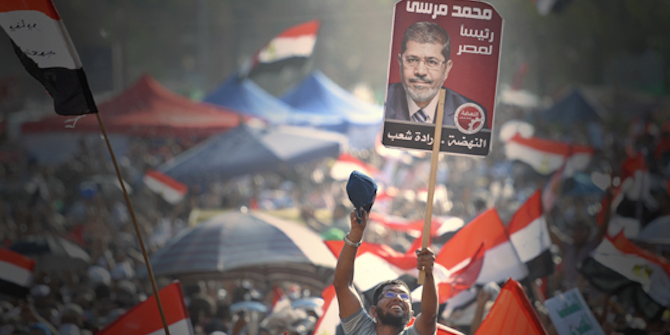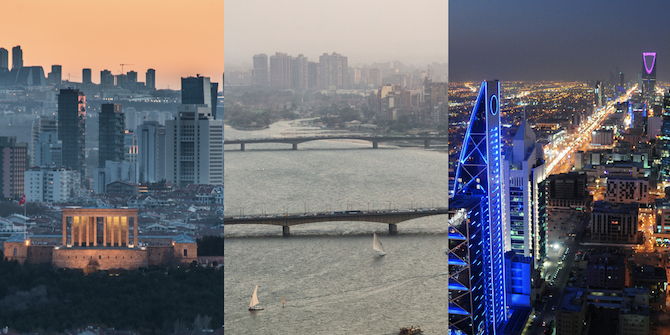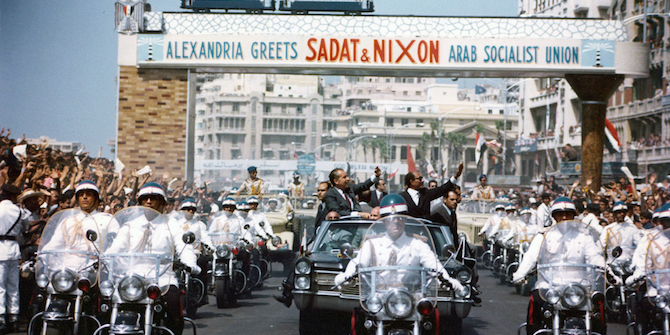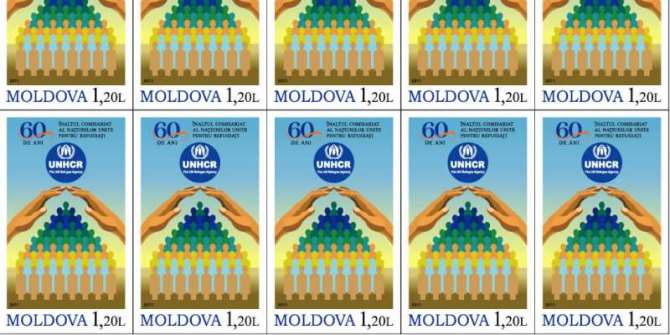by Bilal Hisam and Hakkı Taş

‘I wish we would always work and not talk.’ Hasan al-Banna, the founding leader of the Muslim Brotherhood (al Ikhwan al Muslimun), expressed his desire thusly for diligent action over idle discourse at the organisation’s Fifth Conference in 1939. This sentiment epitomised the Brotherhood’s mission as a movement of praxis, committed to effecting gradual transformation in Egypt and beyond. In an ironic twist, the zenith of the Brotherhood’s influence was in 2012, when its political arm in Egypt ascended to power, only to face, a mere year later, the most severe repression in its history.
As the Brotherhood endeavours to rekindle its vitality within exilic diasporas, the resonance of al-Banna’s original dictum has waned dramatically. Talk now supersedes action. Besides the constrained capacity for action, this shift is propelled by the prevailing climate of newfound liberties in the diasporic environment, as articulated by one of our interviewees: ‘Presently, we are able to engage in candid discourse, broadcast our assemblies, and subject them to scrutiny […] In an unfree environment [i.e. Egypt], it was easier to contain the differences of views. This explains why the crisis took place in Turkey.’ While the Brotherhood promulgated the ‘mihna (ordeal) narrative’ to fortify internal cohesion, this strategy has not eradicated vociferous criticism about what went wrong. The turmoil was exacerbated by two internal organisational disputes: one in 2015 involving Mahmoud Ezzat and Mohamed Kamal, and another in 2021 between the factions of Ibrahim Mounir and Mahmoud Hussein. This elite-level strife ensnared the Brotherhood’s youth ‘in the crossfire,’ further deepening their identity crisis. Between 2021 and 2023, we intermittently undertook fieldwork in Istanbul, centring on the experiences of both past and present members of the Muslim Brotherhood. Our aim was to discern their responses to exile.
Re-framing the Muslim Brotherhood: Idea versus Organisation
The profound chasm between a steadfast belief in the ideals of the Ikhwan and its current predicament has given rise to a spectrum of responses, ranging from assertions of ‘this is not the true Ikhwan’ to even broader declarations of ‘this is not the true Islam.’ Among the interviews, a prevailing sentiment emerges: ‘I draw a distinction between the Ikhwan as an idea and its organisational form; the organisation may wither, but the idea endures.’ This assertion serves as a defence mechanism to overcome the cognitive dissonance and sidestep the arduous task of questioning one’s deeply held convictions. Furthermore, the recurrent statement of ‘This is not the Ikhwan I initially embraced’ across the interviews encapsulates this common disillusionment, coupled with a poignant critique of the current state of affairs and a yearning for the halcyon days of yore. Yet, in contrast to current scholarship which often simplifies the responses of present and former Ikhwan members into a reductive dichotomy of radicals versus atheists, our observations reveal a rich tapestry of reactions within the grassroots of the movement:
- Loyal critics: Some members have a continuing belief in the Ikhwan both as an idea and organisation, but perceive the current predicament as stemming from the misconduct of a select few who wielded their authority poorly. They seek accountability at an individual level. This approach is prevalent among those who have chosen to remain within the movement, yet harbour reservations about its present state of affairs.
- Reform advocates: Many others emphasise the need for further institutionalisation. They advocate for greater empowerment of youth and women to revitalise the organisation. ‘We as youth are included but still lack influence,’ one interviewee complained. This group largely consists of administratively inactive members, though some continue to participate in gatherings like Usra, which represents the bottom core of the Ikhwan’s hierarchy. Notably, many within this group reconnected with the movement in 2021, aligning themselves with Ibrahim Mounir’s faction. An interviewee captured their perspective succinctly, stating, ‘We were merely holding the [Ikhwan’s] ideals. Both I and my peers believe this to be our final opportunity. Pragmatism drives our re-engagement, but it is not a blank cheque [i.e. without scrutiny].’
In fact, both of these first two categories share a sense of pragmatism. They perceive the Ikhwan as an invaluable reservoir of material and human resources, an opportunity too significant to forsake. A pressing question raised by several interviewees underscores this sentiment: ‘to whom should we leave all of these resources?’ There is notably a psychological motive here as well, especially for those over the age of 40, whose lives have been largely shaped by their engagement in the Ikhwan. They are reluctant to sever their ties with the organisation, as one interviewee contends: ‘Do you suggest that all these years have been spent in vain?’ Nevertheless, people in the following categories have already severed affiliations, each for distinct reasons.
- The Revivalists: Some former members still regard themselves as integral to the Brotherhood’s foundational ideals. ‘I am a Muslim brother, period,’ a former member succinctly asserts. Some in this group reproach the prominent figures within the movement, accusing them of distorting the fundamental tenets set forth by al-Banna. Notwithstanding, they remain largely inactive, even amidst recent large disputes. However, many others in this group adopt a more violent position, contending that the only viable means to effect change in Egypt is through a revolution, and acknowledging that it may entail certain violent measures. They posit that the old guards have pacified and distorted al-Banna’s teachings. This faction endeavours to re-evaluate al-Banna’s legacy, highlighting his establishment of a clandestine armed organisation to oppose the British. They claim that the concept of power played a pivotal role in al-Banna’s messages. As one member articulates, ‘Al-Banna alluded to power and violence implicitly only because his communications took the form of articles or speeches addressed to the public.’ It’s worth noting that, while the interviewee himself opposes violence, he critiques the ‘all too naïve’ image of al-Banna promoted within the movement.
- Post-Bannaism or Ideational Dissenters: Some former members venture beyond critiquing individuals and the organisational structure of the Ikhwan, delving into its fundamental principles. They commend al-Banna’s astuteness in simplifying grand ideas for public consumption. Yet, some argue that he offered nothing but practice, while others believe it imperative to transcend his legacy. As articulated by two interviewees, they express a drift from Ikhwan in ideology, without adopting an alternative, while still adhering to the broader Islamic framework.
- The Disenchanted: This shift is notably prevalent among the younger demographic. A significant number of individuals, predominantly below the age of 30, have disengaged from discussions centred around Islamist ideals. Some have redirected their focus towards navigating the challenges of exile or forging a path towards career advancement. Others have embarked on a more profound departure, relinquishing their ties to religion altogether.
Across all these delineated categories, there persists an informal network tethered to the Brotherhood under the conditions of exile. They are still interacting, meeting, and helping each other. ‘My relationship with current and former Ikhwan members is primarily social; we ate bread and salt together [an Egyptian saying expressing friendship and trust],’ one interviewee poignantly stated. Despite enduring personal, organisational, and ideological contentions, many continue to converge at various social gatherings – be it weddings or funerals. These encounters often rekindle memories associated with the movement, whereas the younger cohort reminisces about their activism during the revolution and in the aftermath of the coup.
[To read more on this and everything Middle East, the LSE Middle East Centre Library is now open for browsing and borrowing for LSE students and staff. For more information, please visit the MEC Library page.]






